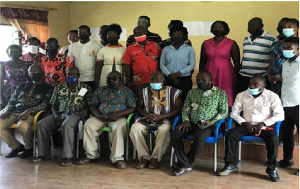Regional News of Friday, 10 December 2021
Source: Stewart Oduro
NCCE undertakes study on knowledge, attitudes and practices towards coronavirus vaccine uptake
The Atebubu-Amantin municipal office of the National Commission For Civic Education (NCCE) with support from the World Bank has undertaken a study on the knowledge, attitudes and practices towards covid-19 vaccines uptake in Ghana.
The two part study involved a survey and a focus group discussion centered on the Atebubu-Amantin municipality.
At a focus group discussion in Atebubu, the municipal director of the Commission Mr. Patrick Tampugre said findings from the study will help shape future policy and strategy for an accelerated vaccine uptake in the country.
Participants were drawn from, traditional authorities, opinion leaders, the Ghana Health Service, youth and women groups, faith based organisations, transport unions and people living with disabilities (PWDs).
The group explored levels of awareness and knowledge of covid-19 in terms of vaccine varieties, symptoms of the disease, case management, safety protocols, awareness of the rate of infection in communities and persons exempted from taking the vaccines.
It also discussed the availability of and accessibility to designated vaccination centres, the length of time spent at vaccination centers, observation of safety protocols at centres and identification requirements.
The study further looked at attitudes of Ghanaians towards the uptake of the vaccines with regards to their willingness to take the jab, and reasons for acceptance or refusal to take the vaccines.
Sources of information on the disease and vaccines were explored whiles looking at potentially inhibiting factors like vaccine availability, accessibility to designated vaccination centres, lack of information or disinformation on the disease and socio cultural factors such as taboos, religious restrictions and myths.
Entertainment










